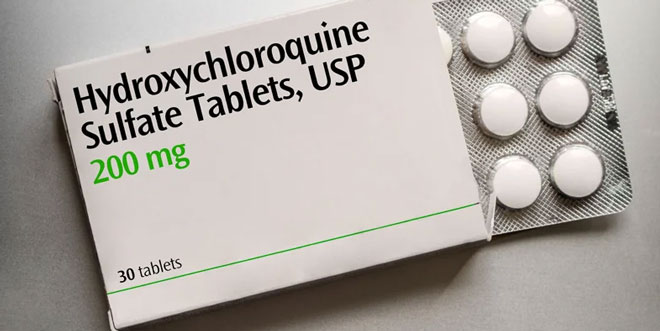Hydroxychloroquine to be used only as last resort medication

By Nayak Paudel
Kathmandu, Apr. 15: Even as there is no evidence that hydroxychloroquine, an anti-malarial drug, is effective in treatment of COVID-19, the government of Nepal has decided to use hydroxychloroquine as a medicine of last resort and keep an essential quantity of the drug stored in view of the emergency.
According to the officials at the Ministry of Health and Population, they are holding discussions with medical experts whether to prescribe hydroxychloroquine to the patients suffering from COVID-19 or not.
Talking to The Rising Nepal, Dr Bikash Devkota, spokesperson at the ministry, said that due to lack of concrete evidence to show effectiveness of hydroxychloroquine in curing COVID-19 and its adverse side effects in patients, the government has not decided to use the drug for now.
“We are holding discussions with medical experts over the prescription of the drug. Since the individuals suffering from COVID-19 are recovering without the use of hydroxychloroquine, the drug is not required in the current scenario,” added Devkota.
However, the ministry said it would remain prepared over the availability of the drug.
Even the Nepali Army is in process to import essential medicines, including hydroxychloroquine, for the treatment of COVID-19 from India.
“The essential medicines were listed by experts in the sector. While some medicines will be used in regular treatment, some (including hydroxychloroquine) will be kept in stock for their easy availability during emergency situation,” said Brigadier General Bigyan Dev Pandey, spokesperson of the Nepali Army.
India has been one of the largest producers and suppliers of hydroxychloroquine in the world. India, which has supplied the drug to multiple countries across the globe, has also agreed to supply hydroxychloroquine to Nepal and other SAARC countries.
The health experts also suggested the government to allow its prescription only if it is accepted by the World Health Organisation (WHO) or proven scientifically.
“We must follow the recommendations of WHO, which has not accepted the use of hydroxychloroquine for the treatment of COVID-19 patients. Even without the specific drug, the patients are recovering from treatment based on their clinical condition,” said Dr Sher Bahadur Pun, chief medical officer at Sukraraj Tropical and Infectious Disease Hospital.
France is among the countries allowing hydroxychloroquine for clinical trial. However, many cases of side effects have been reported due to the drug in patients suffering from COVID-19.
As per the National Agency for the Safety of Medicines and Health Products (ANSM), a French government agency, drugs such as hydroxychloroquine had adverse side effects, mainly cardiovascular.
The ANSM had coordinated with the national network of pharmacovigilance centers for continuous monitoring of effects in patients with COVID-19 due to the use of drugs such as hydroxychloroquine and lopinavir/ritonavir (antiretroviral medicines).
During the monitoring, Dijon pharmacovigilance centre conducted a general survey by listing undesirable effects among patients suffering from COVID-19 and treated with the drug. On the other hand, Nice pharmacovigilance centre carried out a supplementary survey by focusing on the cardiovascular effects of these treatments.
As per information “Medicines used in patients with COVID-19: enhanced surveillance for adverse effects” released by ANSM on April 10, a hundred cases of adverse reactions were reported during the survey.
Among the cases, there were 82 serious cases and four deaths caused by adverse reactions divided by half between lopinavir-ritonavir and hydroxychloroquine.
In the secondary survey, according to ANMS, 53 cases of cardiac adverse effects were analysed which included 43 cases with hydroxychloroquine alone or in combination (mainly with azithromycin).
Since the drug has adverse side effects on the patients while treating them for COVID-19, the French agency urged the use of medicine only in hospitals with close medical supervision.
Meanwhile, the government of Nepal has decided to not use the medicine for now until in case of emergency and unless scientific clarity over the drug’s adverse side effects.
“As many developed countries are using hydroxychloroquine for treatment, we will store it in essential amount and use under proper medical care as a medicine of last resort,” said Devkota.
Even the private pharmaceutical companies in Nepal have pledged to manufacture and provide hydroxychloroquine tablets to the government if needed. Deurali-Janta Pharmaceuticals, through a press statement nearly a month ago, had pledged to provide 400,000 tablets of hydroxychloroquine to the government free of cost if the medicine is needed.
Recent News

Do not make expressions casting dout on election: EC
14 Apr, 2022
CM Bhatta says may New Year 2079 BS inspire positive thinking
14 Apr, 2022
Three new cases, 44 recoveries in 24 hours
14 Apr, 2022
689 climbers of 84 teams so far acquire permits for climbing various peaks this spring season
14 Apr, 2022
How the rising cost of living crisis is impacting Nepal
14 Apr, 2022
US military confirms an interstellar meteor collided with Earth
14 Apr, 2022
Valneva Covid vaccine approved for use in UK
14 Apr, 2022
Chair Prachanda highlights need of unity among Maoist, Communist forces
14 Apr, 2022
Ranbir Kapoor and Alia Bhatt: Bollywood toasts star couple on wedding
14 Apr, 2022
President Bhandari confers decorations (Photo Feature)
14 Apr, 2022











